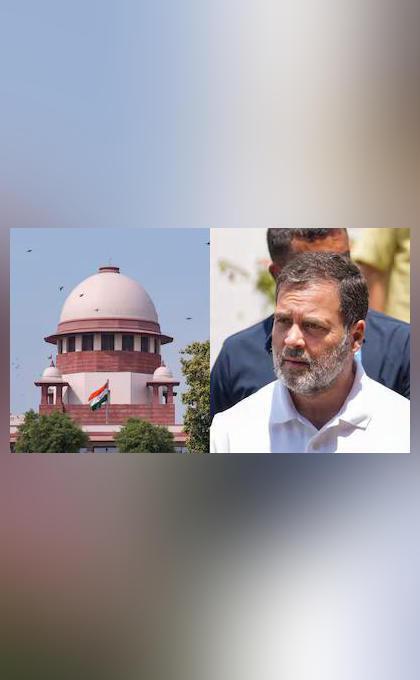
Why Ask on Social Media & Not in Parliament: SC to Rahul on ‘Land Grab’ Claim
The Supreme Court of India has once again turned its attention to the issue of political leaders making sensational claims without proper evidence. Recently, Congress leader Rahul Gandhi made a statement claiming that China had “grabbed” 2,000 square kilometers of Indian land. In response to this statement, the Supreme Court has rebuked Rahul Gandhi, questioning why he makes such claims on social media instead of raising them in Parliament.
The controversy began when Rahul Gandhi made the statement in 2020, claiming that China had occupied 2,000 square kilometers of Indian land. The statement was widely reported and sparked a national debate on the issue. However, the Indian government and the Defense Ministry were quick to deny the claim, stating that there was no evidence to support Rahul’s statement.
In a recent hearing, the Supreme Court stayed a defamation case against Rahul Gandhi for his remarks about the Indian Army. However, the court also expressed its frustration with Rahul’s method of sharing information, stating that he should raise such important issues in Parliament instead of making unsubstantiated claims on social media.
The court’s decision to stay the defamation case against Rahul Gandhi was seen as a victory for the Congress leader, but the court’s words of rebuke were a clear indication that it was not satisfied with Rahul’s handling of the issue. The court’s observations have sparked a national debate on the responsibility of political leaders to verify information before sharing it with the public.
Rahul Gandhi’s statement about China occupying 2,000 square kilometers of Indian land was made in 2020, during a speech delivered in the Lok Sabha. In the speech, Rahul claimed that the Chinese had occupied a large tract of land in the border region of Ladakh. He also accused the government of being complicit in the occupation, stating that the government had failed to take adequate measures to protect Indian territory.
The statement was widely reported and sparked a national debate on the issue. However, the Indian government and the Defense Ministry were quick to deny Rahul’s claims, stating that there was no evidence to support his statement. The government also accused Rahul of making a false and inflammatory statement, which could damage national security.
The controversy surrounding Rahul’s statement highlights the importance of verifying information before sharing it with the public. In today’s digital age, false information can spread quickly and cause harm to individuals and communities. It is the responsibility of political leaders to verify information before sharing it with the public, and to take steps to prevent the spread of false information.
The Supreme Court’s decision to rebuke Rahul Gandhi is a clear indication that it is committed to upholding the principles of truth and accountability in public life. The court’s observations have sparked a national debate on the responsibility of political leaders to verify information before sharing it with the public.
In conclusion, the controversy surrounding Rahul Gandhi’s statement about China occupying 2,000 square kilometers of Indian land highlights the importance of verifying information before sharing it with the public. Political leaders have a responsibility to uphold the principles of truth and accountability in public life, and to take steps to prevent the spread of false information. The Supreme Court’s decision to rebuke Rahul Gandhi is a clear indication that it is committed to upholding these principles.
Source:






